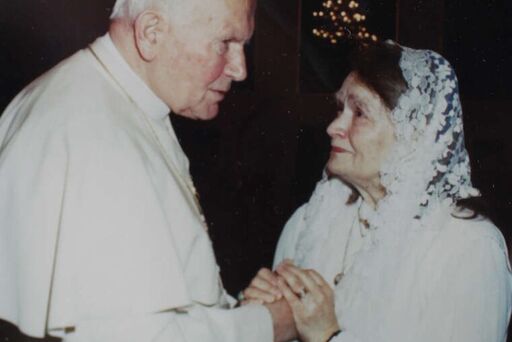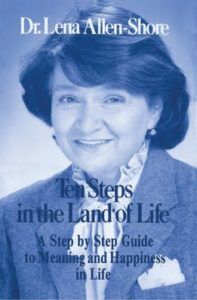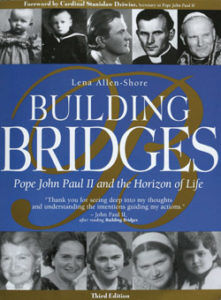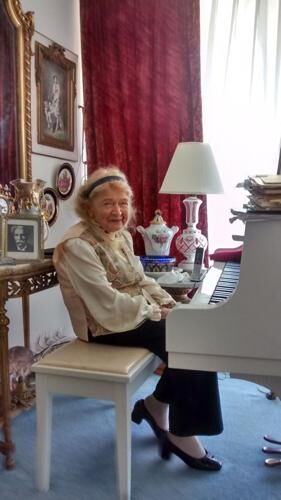Lena Allen-Shore Biography

Therese Lena Allen-Shore (née Herzig) was born on November 17, 1921, in Kraków, Poland to Jakub and Lusia (née Goldman) Herzig. Two years later, her parents welcomed her brother, Adam. Young Lena was very bright and had plans to study at the music conservatory in Lviv before she had to go into hiding to evade Nazi persecution.
After her family’s identification papers were lost, twenty-one-year-old Lena trekked alone to obtain false papers that identified them as Christians. While living under these false names, Lena worked as a secretary in a sawmill and Adam worked as a laborer. On one occasion while using the sawmill’s switchboard, she overheard conversations between the Gestapo and her supervisor about employees at the sawmill. Lena alerted her colleague of his imminent arrest, and he was able to flee. Lena’s bold actions saved other friends as well. Eventually, through the help of righteous gentiles, Lena and her family survived the War.
After the War, she married Sigmond Shore, an engineer and economist, who fought in the Polish resistance. They were married after a short two-week courtship and then moved to Paris. Sigmond worked as a Polish diplomat and Lena as a journalist. Lena gave birth to their first son, Michel. In 1951, Sigmond, Lena, and Michel moved to Montreal where Sigmond started an import-export business. Lena’s parents and brother Adam moved there a year later. In 1956, her father passed away, and Lena named her younger son Jacques after his grandfather. When Sigmond passed away in 1967, Lena took over the operation of his business while also continuing her poetry and writing career. In the mid-sixties, she published two books of poetry, L’orage dans mon couer (1963) and Le Pain de la paix (1964), and her first novel, Ne me demandez pas qui je suis (1965). (Click here for a full list of publications.)
In the 1970s, Lena returned to her studies, earning a Master of Arts in Education from McGill University in 1972. Lena then earned a doctorate in Philosophy from Dropsie College (Philadelphia) in 1974, while commuting back and forth from Montreal. During this time, she befriended many Catholic leaders including Cardinal John Krol, Father Joseph Papin (Villanova University), and Cardinal William Keeler. She married John Edward Greenberg in Montreal in 1974, and the couple moved to Philadelphia in 1979.

Combining her expertise in education and philosophy, Lena founded the Lena Allen-Shore Center for the Advancement of Human Potential. Her courses focused on finding happiness and courage amidst struggle. These included “Ten Steps in the Land of Life,” based on her post-doctoral research at the University of Pennsylvania. Ten Steps was later published as a book. Lena also taught seminars on art and art history, with courses on Michelangelo, Leonardo Da Vinci, and Marc Chagall. The popularity of her center led to its official affiliation with Gratz College. As one of her former students, Father John Gabage recounts, “Her classroom was a haven for dialogue and understanding; her heart was a sanctuary of uncountable blessings.”*

After the election of Karol Wojtyla to the papacy as Pope John Paul II in 1978, Lena wrote him a letter, hoping the ascent of a fellow Polish citizen to this role would help foster better Christian-Jewish relations. This began a decades-long correspondence. In 1996, she traveled to Rome for the first time and received an audience with the Pope along with her son Jacques. Her close friendship with Pope John Paul II led to her to write Building Bridges: Pope John Paul II and the Horizon of Life, which was first published in 2003. While Lena wished to focus only on the Pontiff, John Paul II insisted the book should reflect on her life as well. Lena traveled to Jerusalem where Pope John Paul II visited Yad Vashem and attended the Pope’s visit to Assisi for a day of prayer with representatives from numerous faiths. She also attended the Concert for Reconciliation in 2004, which inspired her to write the piece “Music and Faith.” The Lena Allen-Shore Collection includes more than one hundred letters of their correspondence.
Lena’s creative endeavors—manuscripts, poetry, and educational materials—contain both advocacy for Holocaust education and her hope for a brighter future. Through her writing, she grappled with her personal history and the severe loss of life during the Holocaust. This is apparent in her book Roots and Wings, and poems such as “The Cry from Warsaw,” her cantata, “The Little Shoes,” and her courses on the Holocaust. Her optimism is best expressed in her poem, “I am Going Forward Every Day:”
my own strength is to search for the sun
even when the sky is grey.
Lena sought to find her “patch of pink” among the darkened clouds of the sunset.
Lena passed away on December 3rd, 2018. She was still playing piano two days before her passing. Upon her death, her family gifted her papers to Gratz College. Her legacy of promoting understanding between people is sustained in the digitization of her papers to make them accessible to all.

*Reflections from https://www.lenaallenshore.com/reflections/